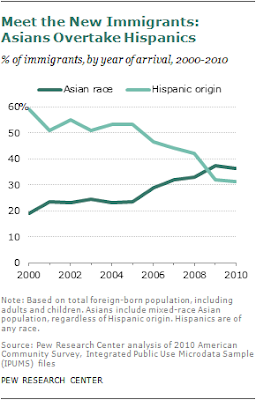Wilfred Reilly (@wil_da_beast630) has a discussion going on at Twitter about which race currently faces the most "systemic racism." Some people are assuming that Asians are victimized by blacks more than whites are. Two sources of data are not very helpful here: hate crimes and victimization data from the National Crime Victimization Survey. Hate crimes are a tiny drop in the bucket of all violence, and you don't see NCVS tables with Asian victims by race of offender. (Let me know if I've missed them.) Victim data in general indicates that Asians face low levels of victimization, which makes sense because most crime is intra-racial, and Asians have very low rates of criminal offending.
Perhaps homicide data is the best way to go here. I looked at expanded FBI homicide data and the Census to calculate rates for being murdered by a black person for two groups: 1) Whites/Hispanics, and 2) Asians/ Native Americans/Pacific Islanders. I'm afraid the FBI lumps people together that way. The rate for group 1 is 2.30 murders per 1 million population. For group 2, it's 1.44 murders per million. According to FBI data, blacks pose more of a threat to whites and Hispanics than Asians plus.



